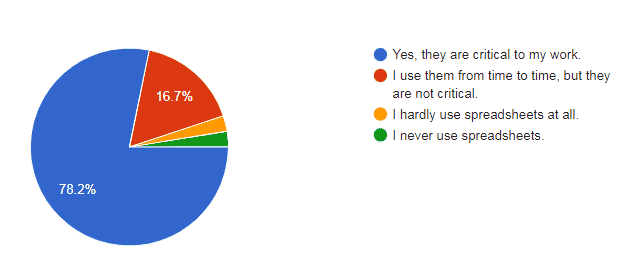Do manual processes such as inputting data to spreadsheets still play a big role in your working life? That’s the question we put to you and the response was a resounding “Yes.”
Among the results we found most surprising in our 2022 MarTech Career and Salary Survey was that 77% of respondents identify spreadsheets as the tool they spend most time (10 or more hours a week) working with.
We understood that this didn’t mean spreadsheets were necessarily critical to the marketing mission. It could have been that they remained simply a time-consuming but useful tool. So we decided to dig deeper, asking explicitly “Are spreadsheets a critical marketing tool?“
An overwhelming majority. Almost 80% of the marketers that responded to the poll said that spreadsheets were critical to their work.

Almost 17% admitted using them from time to time, while only around 5% use them hardly at all or never. It’s necessary to admit that this is a small sample; fewer than 100 respondents. But at the very least it underlines and clarifies the findings of the Career and Salary Survey which was completed by 426 marketers.
Why we care. It’s a reality check. As we like to say, “MarTech is marketing,” by which we mean that today’s marketing is data-driven, and that strategy is guided, for the most part, by the technologies that are available.
Scott Brinker, HubSpot’s VP of platform eco-system, went further earlier this year: “We’re entering a post-digital-transformation era, where companies are no longer planning to become ‘digital.’ They are digital.” Now, while we’re sure that our readers are using digital spreadsheets — Microsoft Excel, for example, rather than paper and pencils — that’s surely not what Brinker means.
Layer our findings over LeanData’s conclusion (from a larger B2B-only survey) that marketing remains “heavily manual” and its hard not to acknowledge that the digital paradise of fully automated (and AI-powered, of course) marketing — for many businesses at least — remains just over the horizon.
























































![Key Metrics for Social Media Marketing [Infographic] Key Metrics for Social Media Marketing [Infographic]](https://www.socialmediatoday.com/imgproxy/nP1lliSbrTbUmhFV6RdAz9qJZFvsstq3IG6orLUMMls/g:ce/rs:fit:770:435/bG9jYWw6Ly8vZGl2ZWltYWdlL3NvY2lhbF9tZWRpYV9yb2lfaW5vZ3JhcGhpYzIucG5n.webp)



















